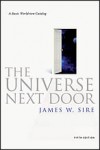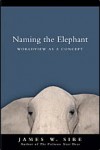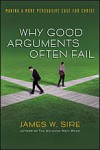Two weeks ago, James Sire addressed a question from me about learning from artists and writers who have a different world view than my own. In his response, he mentioned Alan Jacobs's A Theology of Reading, which I have been reading and blogging through lately. I'd like to expand a bit on Jim's reference to Jacobs's book with a few examples of charitable reading. Throughout the book, Jacobs offers “interludes,” which are essentially case studies of different styles and methods of reading. “Interlude D: Two Charitable … [Read more...] about Reading Pagans (and Christians) with Charity
Question and Answer
What comes after Postmodernism?
A question from friends at Evangelical Seminary: What comes after Postmodernism? What does James W. Sire have to offer in response to the $64 Question -- now by inflation the $64 Million Dollar Question? ------------------------- This question is easy for me to answer. I don't know. In fact, I don't think anyone can know. I like the ad for one financial service. “Can you tell me, Dr. Hammerslammer, as dean of the Business School at Havitall University and the head of the most prestigious financial institution in … [Read more...] about What comes after Postmodernism?
Insights from works by people from other worldviews?
James W. Sire addresses another excellent question from Micheal Hickerson, ESN Blog Contributor: Should Christians worry if they find themselves enjoying or gaining insight from artistic, literary or academic works by people from other worldviews? I know that this has been a question within the Christian world from the ancients to the present. Didn't Tertullian (c. 160-230) ask, “What has Athens to do with Jerusalem?” But, though I was brought up in a modestly fundamentalist community, the question has always … [Read more...] about Insights from works by people from other worldviews?
Does worldview theory lead to relativism?
James W. Sire addresses another excellent question from Micheal Hickerson, ESN Blog Contributor: Is there a danger that acknowledging different worldviews will lead to the position that "all truth is relative"? Yes and No. Yes. If in fact there are different worldviews (and indeed there are), then one way to avoid frustration in dialog between those holding divergent worldviews is to give up the notion that any worldview is more likely to be true than any other worldview. This situation has been realized in our … [Read more...] about Does worldview theory lead to relativism?
What is the biggest challenge to today’s apologist?
James W. Sire addresses: What is the biggest challenge to today's apologist? -- A question received by email inquiry. I doubt that there is a “today's apologist.” Every person engaged in presenting the Christian faith is “today's apologist.” Moreover, I can address the question but I am no longer an active traveling apologist with exposure to “today's” campuses. Among my current friends are a bitter Dawkins-type atheist and retired scientist, a mid-forties New Ager, a curious high school grandson, a liturgical … [Read more...] about What is the biggest challenge to today’s apologist?




